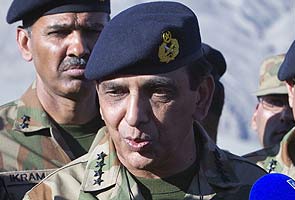
Pakistani troops fired guns and mortars on at least 50 Indian border posts overnight in Kashmir, killing one jawan and injuring six in a show of major aggression. The attacks began on Tuesday night hours after Home Minister Sushil Kumar Shinde visited the region to review security. Indian intelligence agencies say the escalating tension is being driven at least in part by the impending retirement of the Pakistani army chief General Ashfaq Parvez Kayani.
Here are the 10 big developments in the story:
The latest attacks by Pakistan come not along the Line of Control, which is the heavily guarded de facto border in Kashmir, but the International Border - the demarcated and undisputed part of border between India and Pakistan running from Gujarat up north through Rajasthan, Punjab into Jammu - which is usually calmer.
Reacting strongly to one of the worst attacks by Pakistani troops in a decade, Home Minister Sushil Kumar Shinde today said India will give a befitting reply to Pakistan. "Additional BSF troops are being sent to the border," Mr Shinde said.
Pakistan has violated the ceasefire that was called in 2003 nearly 200 times in the last two months. Both sides have accused each other of unprovoked firing. (Pak troops target 50 locations along international border, one BSF jawan killed)
The tension along the Line of Control which has witnessed some of the worst clashes in a decade, has escalated since Prime Minister Manmohan Singh ignored the opposition's advice and met with his Pakistani counterpart Nawaz Sharif last month in New York on the sidelines of the UN General Assembly. It was their first face-to-face meeting since Mr Sharif was elected in May.
Both leaders said they would ask their armies to restore calm along the Line of Control. But India has now decided to put on hold plans for a meeting between military commanders of both countries. (Military-level talks with Pakistan put on hold, say Army sources)
Indian intelligence agencies believe that the recent spate of attacks are based at least partly on the fact that Pakistani army chief General Ashfaq Parvez Kayani retires in November. They feel he wants to assert his position as a hardliner against India in his last few weeks in office.
Indian intelligence officers also say that the attacks are the powerful Pakistani military's way of signalling to Mr Sharif that it will continue to call the shots.
Mr Sharif has, since coming to power in May, stated the need to improve relations with India. Indian intelligence agencies believe that the Pakistani army is working to undermine his attempts. The attacks in the last few days come as Mr Sharif is visiting the US. India believes that the Pakistani army has stepped up attacks to internationalize the dispute over Kashmir.
Before landing in the US, Mr Sharif appeared to suggest that the US should intervene in the Kashmir issue. Both India and Washington dismissed any chance of that. "The world powers should do so (intervene) as India and Pakistan both were nuclear powers and the region was a nuclear flash point," Mr Sharif was quoted as saying by the Associated Press of Pakistan.
Jammu and Kashmir Chief Minister Omar Abdullah has said the Centre will have to look at other options if Pakistan continues to violate ceasefire. "Obviously this cannot be a one sided affair. It cannot be a situation where we are the receiving end and no response is given," he said this week.

